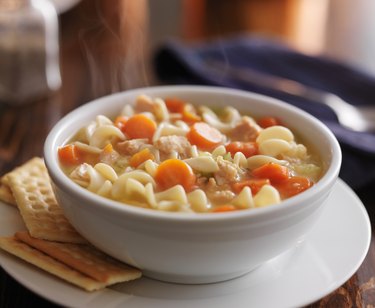
Colitis, also referred to as ulcerative colitis, is a type of inflammatory bowel disease characterized by chronic inflammation of the colon. The symptoms of ulcerative colitis, which include bloating, abdominal pain and diarrhea, usually occur in flare-ups, which means they come and go. After you experience a colitis flare-up, your doctor may recommend a low-residue diet to allow your colon to heal.
Diet Basics
Video of the Day
A low-residue diet limits any foods that remain undigested in your intestinal tract. The purpose of a low-residue diet is to reduce the size and frequency of your stools in an effort to reduce stress on your intestinal tract and allow it to heal. Decreasing the amount and size of stools you produce will also help to reduce the uncomfortable symptoms associated with a colitis flare-up.
Video of the Day
Foods to Avoid
When following a low-residue diet, you need to avoid any foods that contribute to bowel movements. These foods include whole-grain breads and cereals, whole wheat pasta, vegetables, fruits, seeds, nuts and peanut butter. You must also avoid any foods that contain seeds or nuts, such as yogurts, deli meats, cereals and salad dressings. In addition to avoiding these foods, you should limit your intake of dairy products, such as milk, cheese, ice cream, yogurt and cream-based soups, to less than 2 cups per day.
Foods to Eat
The basis of your diet when following a low-residue diet should consist of white breads, refined cereals, white crackers, white pasta, white rice, vegetable juices, fruit juices, tender meat, poultry, eggs, fish and broth-based soups. Choose vegetable and fruit juices that contain no seeds or pulp. If the juice does contain seeds or pulp, strain them before consumption. MayoClinic.com suggests reading labels and choosing carbohydrate-rich foods that contain less than 1 g of fiber per serving. You may also consume oils, butter, smooth salad dressings, honey and syrup.
Considerations
A low-residue diet may not provide all of the nutrients your body needs to stay healthy. Because of this, you should only follow a low-residue diet for a short period of time, until your digestive tract has healed. Work with your doctor or a dietitian to determine how long you should be on the diet, and stick to your treatment plan. Once your colon has healed, your doctor or dietitian may recommend that you switch to a low-fiber diet for a period of time before returning to your normal diet.
Is this an emergency? If you are experiencing serious medical symptoms, please see the National Library of Medicine’s list of signs you need emergency medical attention or call 911.